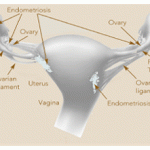What Is Endometriosis
 Endometriosis refers to growth of cells similar to those that are formed inside the uterus which are called endometrial cells. But these cells grow outside the uterus and attach themselves to ovaries, fallopian tubes, intestines and surface of uterus. But there is no need to worry as they are not cancerous growth and are benign. Yet they are a cause of concern among women. But this is the condition which can be cured to a great extent unlike cancer.
Endometriosis refers to growth of cells similar to those that are formed inside the uterus which are called endometrial cells. But these cells grow outside the uterus and attach themselves to ovaries, fallopian tubes, intestines and surface of uterus. But there is no need to worry as they are not cancerous growth and are benign. Yet they are a cause of concern among women. But this is the condition which can be cured to a great extent unlike cancer.
Who get affected?
There are countless women suffering worldwide due to this problem. A study says that in US more than one million women suffer due to Endometriosis. Generally, the women in the reproductive age are the main targets and primarily affect those in the age group 25-35 years. The youngest one to get affected so far is an 11 year old child.
Endometriosis Causes
The main reason for the condition is yet to be discovered. But certain possibilities have been narrowed down. They are
- Disposition of the cell when there is a reverse flow of menstrual periods
- Growth of tissue cells like cells into the uterus which have not be treated
- A result of surgical scars. While performing operation, some of the cell may have of moved to a different location
Signs and Symptoms of Endometriosis
- Pain in the pelvis area
- Infertility
- Cramps during intercourse
- Pain while passing urine
- Fluctuating pain which may be different in each month
Endometriosis Treatment, Cure
A visit to the doctor is important. The doctor would advise to get a Laparoscopy done for diagnosing the condition and a MRI and Ultra Sound scan for ascertaining and evaluating the intensity of the situation.
The cure for this condition may involve a mix of therapies.
To begin with non-steroidal inflammatory medicines would be administered. Next, Gonadotropin releasing hormonal drug may be used. Removal of ovaries is also an option. Even herbal medicines like Endomet may be used.
While treating for Endometriosis, the doctor first aims to reduce the discomfort and pain and control the spread of the disease. Since the fertility of the women is in question the doctors try to cure the person as soon as quickly as possible.
The affected women may have to go through alternative routes to conceive a child. The chances of recurrence of the disease are 5% to 20%. But those nearing menopause run a higher risk of up to 40%.